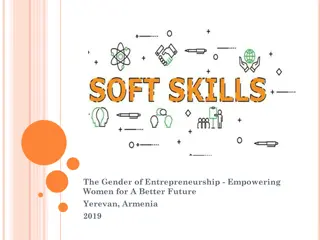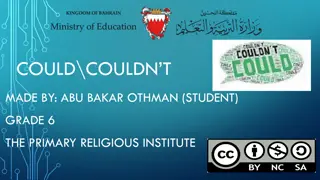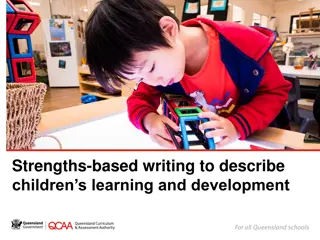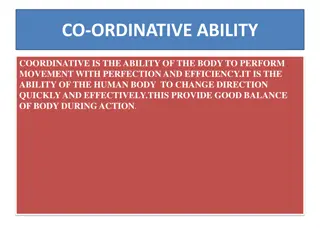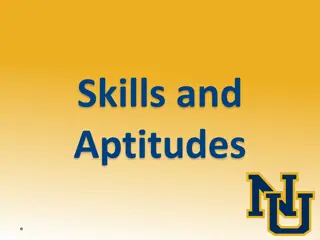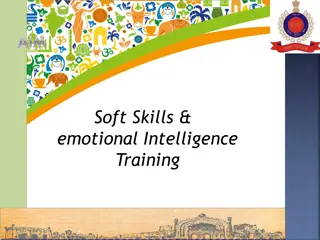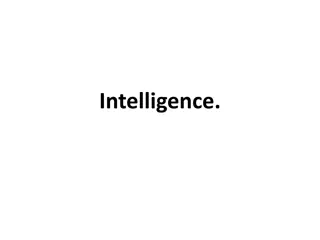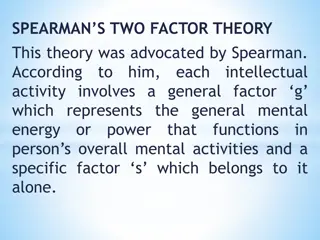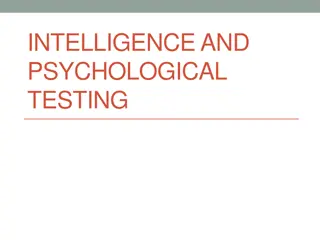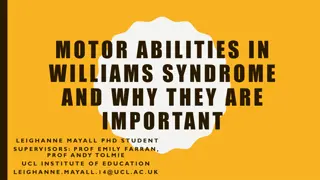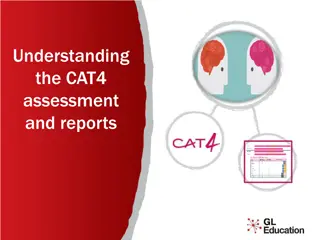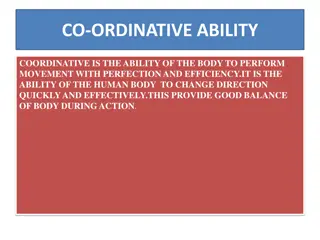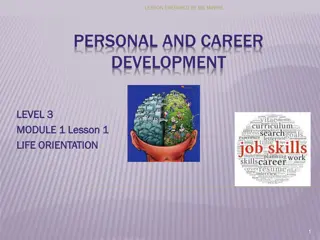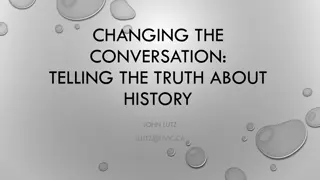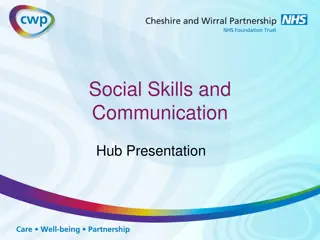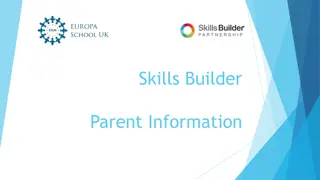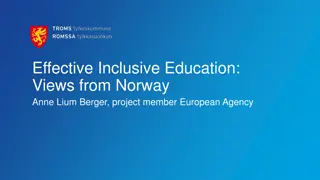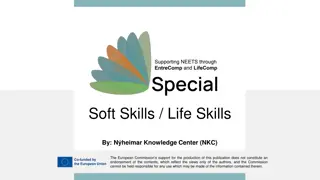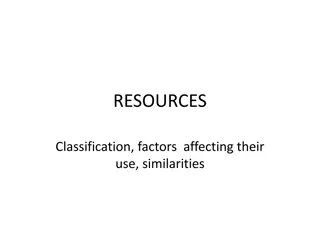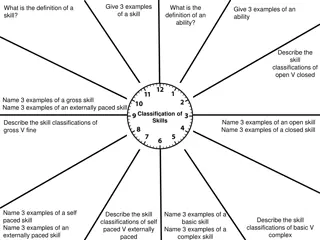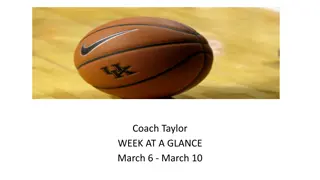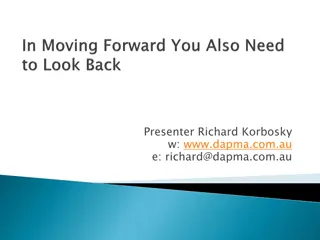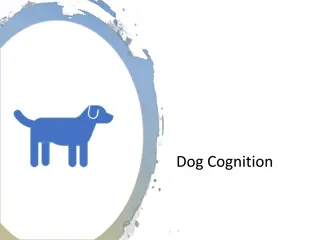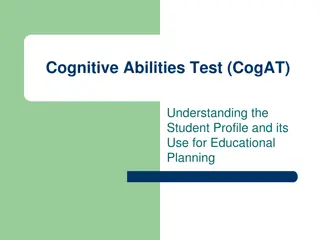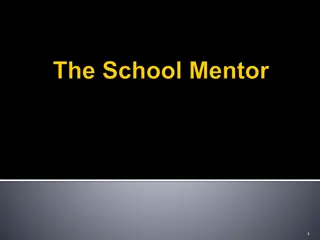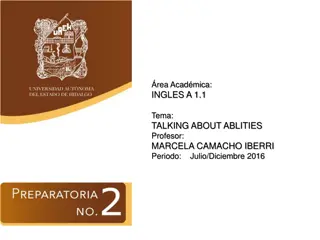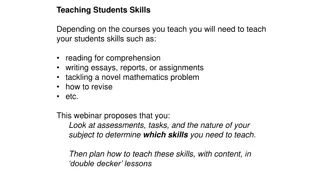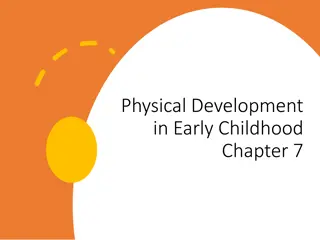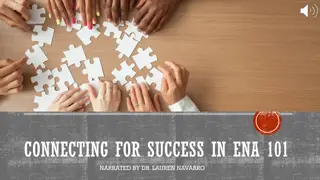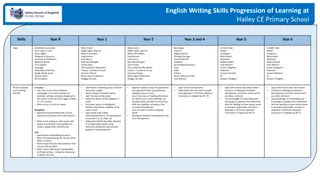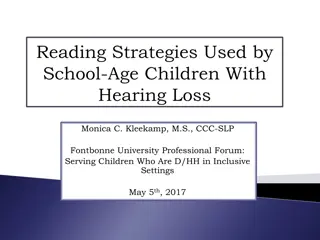Understanding Brain Development and Decision-Making Skills
Explore the fascinating realm of brain development and decision-making skills, focusing on how different brain regions activate during decision-making, the evolution of decision-making abilities from adolescence to adulthood, the importance of practicing decision-making skills, and the influence of
6 views • 10 slides
Understanding Neuropsychological Assessment: Insights and Applications
Neuropsychological assessment plays a vital role in understanding brain-behavior relationships. This process involves determining cerebral functioning, identifying dysfunction, and assessing cognitive abilities through a combination of interviews, observational data, and testing. The assessment aids
3 views • 33 slides
Importance of Teaching Life Skills for Healthy Child Development
Life skills education plays a crucial role in promoting healthy child and adolescent development by enhancing adaptive behavior, problem-solving abilities, and social skills. It encompasses three core areas: thinking skills, social skills, and emotional skills. Teaching life skills is essential for
4 views • 15 slides
Unveiling the Power of Soft Skills in Professional Success
Soft skills play a crucial role in enabling individuals to interact effectively and achieve their goals. The types of soft skills, including communication, leadership, influencing, interpersonal, and personal skills, highlight the diverse abilities needed to navigate today's dynamic work environment
0 views • 12 slides
Learning to Use "Could" and "Couldn't" for Past Abilities
Enhance your understanding of using "could" and "couldn't" to describe past abilities with examples and exercises. Practice completing sentences correctly and check your answers to improve your grammar skills effectively.
0 views • 7 slides
Understanding Strengths-Based Writing for Children's Learning and Development
Strengths-based writing focuses on identifying and emphasizing children's strengths and abilities to support their learning and development. This approach is inclusive, helping teachers discover strategies tailored to each child's unique strengths for enhanced success in learning. Principles and res
0 views • 21 slides
Understanding the Importance of Coordinative Abilities in Sports
Coordinative ability is crucial in sports for performing movements with precision and efficiency. It involves the body's capability to change direction swiftly, ensuring good balance during actions. This ability comprises various types such as orientation, reaction, rhythm, balance, adaptation, coup
1 views • 11 slides
Exploring Skills, Aptitudes, and Occupations
Understanding the different skills and aptitudes required for various tasks, such as acting in a school play, can help individuals develop transferable abilities applicable to different situations. From basic skills to resource management skills, exploring the world of occupations and vocations prov
1 views • 6 slides
Comprehensive Soft Skills & Emotional Intelligence Training for Police Officers
This training module aims to equip police officers with soft skills and emotional intelligence, essential for effective communication, conflict resolution, and professional development in policing. It covers understanding concepts, importance of attitude, behavior impact on communication, conflict d
1 views • 26 slides
Enhance Reading Skills with KS2 Reading Vipers | Literacyshed 2017
KS2 Reading Vipers is a set of reading prompts designed to improve key reading skills among Key Stage 2 students. These prompts are based on the 2016 reading content domains from the National Curriculum Test Framework. The prompts cover various skills such as vocabulary, inference, prediction, expla
0 views • 11 slides
Understanding Different Theories of Intelligence
Intelligence encompasses various abilities including adaptability, capacity for knowledge, reasoning, and more. Theories such as Spearman's two-factor theory and Sternberg's Triarchic Theory offer insights into different aspects of intelligence, highlighting factors like problem-solving abilities, c
1 views • 11 slides
Understanding Spearman's Two-Factor Theory
Spearman's Two-Factor Theory posits a general mental energy factor (g) and specific abilities factors (s), determining individual intelligence. The g factor is innate and crucial in various activities, while the s factor is acquired and varies per task. Despite criticisms regarding the oversimplific
0 views • 9 slides
Understanding Psychological Testing: Key Concepts and Applications
Psychological testing encompasses various measures to assess intelligence, abilities, aptitudes, personality traits, and more. These tests are standardized to ensure reliability and validity, providing valuable insights into an individual's psychological profile. Key concepts include mental ability
2 views • 18 slides
Motor Abilities in Williams Syndrome and Their Importance
Motor abilities play a crucial role in the developmental journey of individuals with Williams Syndrome. From simple reflex movements to fine and gross motor skills, these abilities impact daily living, academic achievements, and overall cognitive and physical growth. Research on motor skills in both
0 views • 20 slides
Understanding the CAT4 Assessment and Reports
CAT4, the Cognitive Abilities Test Fourth Edition, assesses students' abilities in verbal, quantitative, non-verbal, and spatial reasoning. It distinguishes between ability and attainment testing and is used to identify academic potential, understand student thinking, determine support needs, highli
1 views • 15 slides
Enhancing Coordinative Abilities in Sports: Types and Benefits
Coordinative ability is essential in sports for achieving movement precision and efficiency, with elements like orientation, reaction, balance, rhythm, and more playing key roles. Enhancing these abilities leads to improved performance, agility, and overall sports proficiency.
4 views • 11 slides
Understanding Personal and Career Development: Skills and Abilities
Explore the concept of personal strengths, abilities, and work skills as essential components of personal and career development. Learn the difference between hard skills and soft skills, and how they contribute to overall success in the workplace. Discover how to recognize, develop, and leverage yo
0 views • 17 slides
The Value of Liberal Arts Education in Today's Job Market
Parents and students are encouraged to consider the benefits of a liberal arts education, as it equips students with essential skills demanded in the current and future job market. Employers value soft skills developed through liberal arts studies, such as critical thinking, communication, and probl
0 views • 20 slides
Enhancing Social Skills and Communication Abilities
This presentation focuses on improving social skills and communication, including non-verbal cues, body language, and eye contact. It highlights the importance of understanding social situations and provides insights on navigating interactions effectively. The session offers practical tips for indiv
0 views • 35 slides
Lifesaving and Swim Program Overview for Year 8 Students
In weeks 2 and 3 of Term 4, 2024, Year 8 students will participate in a compulsory Lifesaving and Swim Program, choosing from 5 different courses. These courses cover water safety, swimming skills, survival abilities, and include assessments to gauge proficiency. The program aims to enhance students
0 views • 9 slides
Enhancing Defensive Skills and Situational Awareness in Hockey
Enhancing defensive skills and situational play in hockey is crucial for success. All team members can contribute to team defense by developing skills like skating, body checking, understanding the ice surface defensively, read and react abilities, and effective communication. Proper skating skills
3 views • 45 slides
Understanding America Study: Cognitive Functioning Measures
The Understanding America Study (UAS) focuses on developing web-based cognitive functioning measures, including tests for fluid abilities, verbal skills, executive function, and processing speed. Utilizing data from about 9,000 panelists, tests like the Stop and Go Switch task are administered onlin
0 views • 26 slides
Enhancing Self-Regulation Skills in Children: Strategies and Tips
Understanding and fostering self-regulation in children is crucial for their development. Self-regulation involves controlling impulses, focusing, and shifting between tasks. This article delves into the internal mechanisms of self-regulation, such as executive function, and provides practical tips
1 views • 22 slides
Skills Builder Program Overview
Skills Builder is a program designed to help students understand and progress in key skills through school programs, benchmarking tools, and a Home Learning Hub. The program focuses on measuring students' progress, discussing skills in lessons, and providing resources for families to support skill d
0 views • 8 slides
Ensuring Inclusive Education in Norway
Norway's education system promotes equity by providing equal opportunities for all children regardless of gender, location, or learning abilities. With a focus on adaptive education, the system caters to individual needs and abilities, ensuring all students can achieve their potential. Special needs
0 views • 15 slides
Soft Skills and Life Skills Overview
Soft skills, also known as life skills or people skills, encompass interpersonal and social abilities that enable effective interaction with others. They are acquired through daily life experiences and reflections, in contrast to hard skills gained through formal education. This overview delves into
0 views • 36 slides
Understanding Resources: Classification, Factors, and Similarities
Resources play a vital role in satisfying our needs and achieving our goals. They can be tangible or intangible, material or human attributes. This includes time, energy, knowledge, skills, abilities, and more. Human resources originate internally and are inherited with unlimited knowledge. Skills a
0 views • 13 slides
Understanding Skills and Goal Setting in Sports
This content delves into various aspects of skills, abilities, classifications of skills, goal setting in sports, and the information processing model. It covers definitions, examples, classifications, and types of skills in sports, along with concepts like outcome goals, performance goals, and SMAR
0 views • 15 slides
Coach Taylor - Weekly Overview: Competencies, PE Standards, and Activities
This week's focus at school includes developing writing and speaking skills, teamwork behaviors, problem-solving abilities, and community responsibility. Additionally, physical education standards are highlighted, covering motor skills, health-enhancing activities, and responsible behavior. Students
0 views • 7 slides
Interactive Mathematics Card Games for Secondary School Students
Many students enter Secondary School with a lack of key maths concepts such as fractions, decimals, and percentages, along with poor basic number skills and attitudes. The strategy presented aims to help parents, teachers, and students bridge these gaps using 12 different physical card games. These
0 views • 12 slides
Dog Cognition: Understanding the Advanced Cognitive Abilities of Dogs
Exploring the fascinating realm of dog cognition reveals how dogs exhibit advanced cognitive abilities beyond that of many non-human primates. From social learning to strong discrimination learning, contingency reversal, and object manipulation, dogs showcase remarkable intelligence that continues t
0 views • 35 slides
Understanding Cognitive Abilities Test (CogAT) for Educational Planning
The Cognitive Abilities Test (CogAT) is a benchmark test administered to third-grade students in the WCPSS for educational planning. The test measures verbal reasoning, math reasoning, and visual-spatial reasoning skills through different subtests and composite scores. These scores help in predictin
0 views • 17 slides
Importance of School Mentor Teachers in Teacher Development
The role of School Mentor teachers is crucial in supporting beginning teachers by providing day-to-day assistance, training, and fostering a supportive relationship. Selecting Mentor teachers carefully is essential to ensure the personal and professional well-being of new educators. Criteria for sel
0 views • 28 slides
4-H Food Challenge: Empowering Youth Through Cooking Skills and Leadership
Engage youth in the 4-H Food Challenge to learn about nutrition, food preparation, and cooking skills. Participants develop recipes, create presentations, and build leadership abilities. The program promotes healthier food choices, kitchen safety, and economic awareness. Youth gain valuable skills a
0 views • 8 slides
Talking About Abilities in English Language Class
In this English Language class taught by Prof. Marcela Camacho Iberri, students explore the use of the modal verb "can" to express abilities, requests, permissions, and possibilities. They also learn how to describe personal projects, aspirations, and talents. Through practical exercises and convers
0 views • 12 slides
Effective Teaching of Essential Skills for Students in Various Courses
Develop a strategic approach to teaching crucial skills such as reading comprehension, essay writing, problem-solving, and revision to students in different academic disciplines. Embrace assessments, tasks, and subject-specific content to enhance skill acquisition. Integrate study skills with real c
0 views • 44 slides
Early Childhood Physical Development Overview
Physical development in early childhood encompasses growth in height and weight, brain development, gross motor skills, and fine motor skills. Children's bodies change significantly between ages 3 to 6, with notable improvements in motor skills and cognitive abilities. Gross motor activities such as
0 views • 15 slides
Enhancing Writing Skills for Academic and Professional Success
Join ENA 101 to improve your writing abilities with guidance from Dr. Lauren Navarro. This course focuses on honing your writing skills through various activities, discussions, and feedback sessions to boost your confidence and produce high-quality essays. Embrace your unique experiences and storyte
0 views • 14 slides
English Writing Skills Progression at Hailey CE Primary School
Learn about the progression of English writing skills at Hailey CE Primary School, covering different topics and skills from Reception to Year 6. Students develop phonetic and whole-word spelling abilities, progressing from basic letter recognition to more complex words and homophones. The curriculu
0 views • 5 slides
Understanding Reading Abilities in Deaf/Hard of Hearing Children
Monica Kleekamp discusses the delayed reading abilities of children who are deaf/hard of hearing and explores the correlation between reading levels and phonological awareness. Different approaches to reading instruction and research questions on reading strategies, narrative comprehension, and impa
0 views • 21 slides



